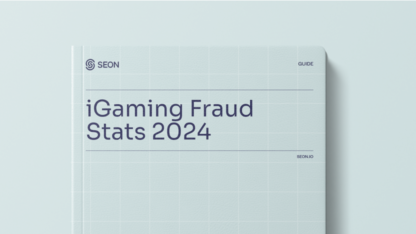Episode five of the SEON podcast features Dave Parrott, Payments and Product Risk Director At Jagex. He has recently graced the SEON Cat & Mouse to explain how they deal with fraud. Here are 5 key points we learned.
The Runescape titles have been running for 18 years, and currently hold 260 million player accounts. But as the platform supports in-game payments, its publishing company, Jagex, needs to keep a close watch on Runescape fraudsters (and those trying to exploit their other games too).
This is precisely the job that Dave Parrot and his team perform daily at the company. In an enlightening interview for the SEON podcast, he shared some of the tips he’s learned during his long and successful career.
#1 Jagex Doesn’t Do Manual Reviews
Jagex, like many modern online companies, works fast and focuses on creating an experience that’s as frictionless as possible for its players. Even if that means sacrificing some sales to potential fraudsters.
“We’re an online video game producer, so all our products are online. It’s all digital content. We offer our products around the world, and it’s 24/7. And like anything online there’s an expectation: when you buy, you get it straight away. We measure payment to fulfillment in seconds, so the idea of a manual review doesn’t work.”
Moreover, online gaming is tight-knit and vocal. If Jagex were to try manual reviews with a subset of their user base, the information would spread fast, causing a backlash for the company.
The flipside, of course, is that working with digital content doesn’t involve physically shipping products. Losing one order doesn’t damage their bottom line. This allows the fraud team to take on a certain level of risk that traditional retail organizations cannot afford.
#2 Chargeback Rates Are Too Slow to Be Factored In
Continuing with the idea of working fast and without creating friction, Dave explains how their fraud prevention system is set up.
They have core rules that never change, and then the second tier of rules which they can turn on and off as needed. Machine Learning isn’t used for real-time analysis, but they do have data scientists who use ML to suggest rules.
However, the most surprising thing is that chargeback rates don’t actually help them with their analysis:
“We don’t have time to wait for chargebacks to come through. They take between 12 to 24 hours, so chargeback reviewing doesn’t fit into what we do, so we don’t have to worry about that. It takes too long so we have to very much go off what is happening in real time.”
Instead, the company focuses on understanding user behaviour. This is something they have a load of key data about, as they can easily monitor the player’s actions in the games, and understand what their goal is, before they even get to the payment screen.
#3 Their Best Team Members Come From Customer Service
In Dave’s experience, it’s easier to teach someone how fraud works rather than explain how the product works from scratch:
“Everyone who’s ever been in the team has come from our customer service department. We’ve always sourced from that because those people learn the game, they learn our customers, they learn about how people interact with the product. They quite quickly get an idea of what is normal, and then can quite easily pick out what isn’t.”
This is a point which he later develops when explaining what a good fraud manager should know….
#4 Understanding Fraud Means Understanding Payments First
Towards the end of the interview, David gave some excellent advice to junior fraud managers.
“If you’re in the fraud industry, you’re in the fraud and payments industry. You can’t separate the two in my mind. You have to understand how payments work, how they authorize, how they go through your system, how they go to acquirers… Because if you don’t understand that flow, you can’t understand how to influence that flow for fraud protection.”
This advice definitely aligns with what both Jacqueline Hart of Patreon and Ada Lovelace have been saying in our previous episodes. Understanding the system (and how to use it to your advantage) is what makes a great fraud manager in the first place.
#5 Automating Processes is Key
Dave’s second piece of advice is just as important, as it relates to leveraging automation:
“Whatever work you’re doing, consider how you could be doing it more efficiently. How could you automate that process from day to day. Every time you’re looking at a single payment or bad account or things like that: how could I be doing it for a thousand at once rather than one.”
It’s certainly something we agree with at SEON, as we focus on delivering tools that enable fraud managers to scale their operations with maximum control.
Key Takeaways
The more we explore how fraud managers work, the more we can see how each industry’s challenges are unique.
In fact, it’s a point that Dave repeatedly made in the interview: “you have to play to your advantage”.
For Jagex, it means understanding the benefits of not having to ship a product and dealing with digital-only. For another company, it will be about collecting as much data as possible during the checkout process.
And the key for us, at SEON, is to continue delivering anti-fraud services that allow for flexibility and customisation, regardless of your vertical of risk vectors.
You might also be interested in reading about:








